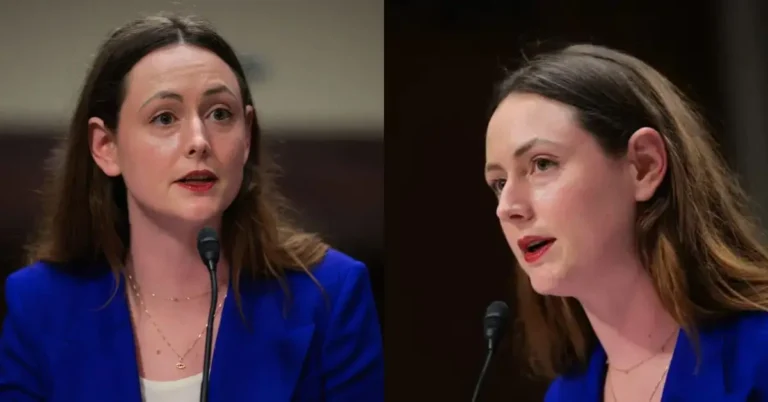Rachel A. Cohen, a Harvard Law School alumna and former finance associate at a leading global law firm, has emerged as a significant figure in the legal community. Her resignation in March 2025, prompted by concerns over her firm’s response to political pressures, has sparked widespread discourse on the ethical responsibilities of legal professionals in the face of governmental overreach.
Early Life and Education
Cohen’s commitment to social justice was evident early in her career. After earning a B.A. in Political Science and Strategic Communication from Ohio State University in 2014, she engaged in various advocacy roles, including positions at the Boys and Girls Clubs of Columbus and as an English literature teacher in Providence Public Schools. Her activism extended to volunteering with Planned Parenthood of Southern New England and participating in committees for the Rhode Island Democratic Party and the National Organization for Women.
In 2019, Cohen commenced her legal studies at Harvard Law School. During her tenure, she held leadership roles in the Harvard Immigration Project and the Journal of Law & Gender, and contributed to the Prison Legal Assistance Project and the Women’s Law Association. She graduated in 2022, equipped with a robust foundation in both legal theory and practical advocacy.
Professional Tenure and Resignation
Upon graduation, Cohen joined a prominent law firm’s Chicago office as a finance associate. Her work encompassed banking law and a dedicated pro bono practice focusing on immigration and housing issues. However, her tenure was marked by growing concern over the firm’s response to political pressures, particularly those emanating from the Trump administration.
In March 2025, Cohen tendered her resignation, citing the firm’s inadequate stance against the administration’s actions targeting law firms. She criticized another firm for agreeing to eliminate diversity, equity, and inclusion (DEI) hiring practices and committing to $40 million in pro bono work aligned with the administration’s policies. Cohen viewed such concessions as undermining the independence and ethical obligations of the legal profession.
In her resignation email, Cohen stated: “We do not have time. It is now or it is never.” She also organized an open letter, garnering nearly 2,000 associate signatures, urging law firm leaders to defend the rule of law. Her actions have been recognized as a courageous stand for legal ethics and democratic principles.
Comparative Analysis: Cohen’s Advocacy vs. Traditional Legal Norms
| Metric | Rachel A. Cohen’s Approach | Traditional Legal Approach | Contextual Footnote |
|---|---|---|---|
| Response to Political Pressure | Proactive and public protest | Typically cautious or silent | Cohen’s open resignation contrasts with the usual discretion in large law firms. |
| Commitment to DEI Practices | Strong advocacy and defense | Varies; some firms have compromised | Cohen criticized firms for abandoning DEI under pressure. |
| Pro Bono Engagement | Focused on immigration and housing law | Often broad but less targeted | Cohen’s pro bono work was mission-driven. |
| Public Communication | Utilized social media and open letters | Generally private or through official channels | Cohen’s transparency was atypical for the industry. |
| Career Risk Tolerance | High; willing to resign on principle | Generally risk-averse | Cohen prioritized ethics over job security. |
Conclusion
Rachel A. Cohen’s resignation represents a pivotal moment in the legal profession’s confrontation with political pressures. Her unwavering commitment to ethical principles and the rule of law serves as an inspiration for lawyers and advocates committed to justice and integrity.
FAQ’s
What prompted Rachel A. Cohen’s resignation?
Cohen resigned due to her firm’s perceived failure to oppose the Trump administration’s actions against law firms, including threats to revoke security clearances and pressure to alter hiring practices. She viewed the firm’s inaction as a threat to the rule of law and legal independence.
How did Cohen’s resignation impact the legal community?
Her resignation galvanized discussions about the ethical responsibilities of lawyers and the importance of resisting political interference. The open letter she organized demonstrated significant support among associates for standing up to such pressures.
What is the significance of Cohen’s focus on DEI practices?
Cohen emphasized that abandoning DEI initiatives under political pressure undermines efforts to create a more inclusive legal profession. She argued that such concessions compromise the integrity and independence of law firms.
How did Cohen’s background influence her actions?
Her extensive experience in advocacy and social justice, including work with Planned Parenthood and the National Organization for Women, informed her commitment to ethical principles and willingness to take a stand against perceived injustices.
What has been the response to Cohen’s resignation?
Cohen has been honored for her courage in defending the rule of law. Her actions have been lauded as a call to action for legal professionals to uphold ethical standards and resist authoritarian influences.
Has Cohen continued her advocacy after leaving her firm?
Yes, Cohen remains active in advocating for legal ethics and independence. She continues to speak out on issues affecting the legal profession and democratic principles.
What lessons can be learned from Cohen’s actions?
Cohen’s stand illustrates the importance of individual courage in challenging systemic issues. Her actions serve as a reminder that legal professionals have a duty to uphold justice, even at personal or professional risk.

